Part 1: The Remote Job Search Process Has Changed (Here’s How!)
Remote work has gone from a niche option to a mainstream reality, thanks to fast tech advancements, changing economies, and, of course, the global pandemic. The way we work has transformed, and so has the way we search for jobs. And around here? That’s a really good thing.
If you’re hoping to land your next (or first) remote role, the remote job search process is no longer the same as it was even five years ago. It’s a whole new ball game, but don’t worry—by understanding the changes and how to handle them, you’ll be better equipped to find your dream remote job.
In this blog post, I’ll break down five shifts in the remote job search process (and what advice I have from my experience as a remote career coach). Plus, stay tuned. In part 2, I’ll dive into even more trends like AI, “ghost” job postings, scams, and more.
Table of Contents
1. Remote Job Applications Are No Longer One-Size-Fits-All 2. Networking is Essential for Landing Remote Jobs 3. Half-A*s Applications Don’t Work Anymore (Especially Remotely) 4. You Need a Personal Brand To Attract Remote Employers 5. The Remote Job Interview Process is Longer and More Involved1. Remote Job Applications Are No Longer One-Size-Fits-All
In the past, landing a job was as simple as submitting a polished resume and, if you were feeling extra ambitious, a thoughtful cover letter. However, the days of “set it and forget it” job applications are long gone. Now, remote job seekers need to step up their game if they want to stand out in a competitive remote job market.
What Hiring Managers Look For in Remote Resumes
Then:
A resume and optional cover letter were enough to be considered.
Now:
Tailored resume: Your resume needs to be customized not only for the job you’re applying to but also to get past the Applicant Tracking Systems (ATS). This means using the right keywords that match the job description, among other considerations such as formatting.
👉 Access the FREE Resume Revamp Checklist for remote jobs.Cover letter: While still optional in some cases, the cover letter can be a valuable tool to showcase your personality and highlight particular aspects of your skills and experience that you want to highlight.
Demonstration of skills: Employers are no longer content with just reading about your skills—they want proof. Whether it’s a portfolio, case studies, or a project you’ve done, showing your skills rather than just stating them can make you stand out.
Pro tip: Show your ability to perform the job in a creative and unique way, such as sharing results from previous projects or even creating a video application. Employers want to see more than what’s on paper—they want proof that you can deliver.
2. Networking is Essential for Landing Remote Jobs
Networking has always been important, but in today’s remote job market, it’s absolutely one of the most important things you can do. Statistics show that a huge percentage of jobs are filled through personal and professional networks.
How Referrals Build Trust with Remote Employers
Referrals are one of the most powerful tools in the remote job search process. Not only do they open doors, but they also give employers an added level of trust. In fact, 85% of jobs are filled via networking, and you’re 72% more likely to get an interview through a referral compared to less than 5% if applying cold.
(These stats come from here and here).
Think of it this way: if you were buying a new pair of jeans, you’d likely trust a friend’s recommendation over an online ad, right? Now imagine employers doing the same thing, but instead of jeans, they’re investing tens of thousands of dollars in hiring you. They want to feel confident that they’re making the right choice, and personal recommendations from trusted sources help to build that confidence.
How to Build Strong Networking Skills for Remote Work
Pro tip: Growing strong networking skills doesn’t just help you land a remote job—it helps build long-term job security by keeping you connected and relevant in your field.
Developing the skill of networking comes down a lot to psychology and understanding people and how they work. If you want to go deeper into HOW to network, I go into it in The Remote Career Accelerator and my 1:1 Remote Career Coaching.
3. Half-A*s Applications Don’t Work Anymore (Especially Remotely)
Listen, I hate to be the one to tell you, but gone are the days when you could send out a generic resume to a dozen companies and expect a call back. Today, employers want to see that you’ve done your homework and that you’re truly invested in the position you’re applying for. With hundreds of applicants for each role, low-effort applications simply won’t make the cut.
Why Low-Effort Remote Job Applications Get Overlooked
What does this mean?
It’s more important than ever to craft thoughtful, targeted applications that show why you’re the perfect fit for the role. But here’s the good news: you don’t have to start from scratch for every application. By creating a well-optimized “master” resume, you can make slight tweaks to tailor it for each job you apply for. This is an easy way to make sure that your application is both personalized and relevant without becoming overwhelming and feeling like you’re starting from scratch each time.
3 Quick Ways to Strengthen Your Remote Applications
How to improve your applications:
Use keywords from the job description to get past ATS filters.
Take the time to write a cover letter that directly addresses the job requirements and shows your enthusiasm for the company.
Consider including a portfolio or examples of your work to further set yourself apart.
Need help? I dive into this in greater detail in The Remote Career Accelerator, 1:1 Remote Career Coaching, and The Remote Resume Bundle.
4. You Need a Personal Brand To Attract Remote Employers
In today’s digital world, having a personal brand isn’t just for influencers or entrepreneurs—it’s for job seekers too. Think about it: a study by LinkedIn found that 75% of hiring managers use LinkedIn to research candidates before they ever reach out. Plus, 92% of them said that a strong personal brand makes the candidate more hireable.
Basically, in 2024, if you don’t have a strong online presence, you’re missing out on an opportunity to make a really positive first impression (which is critical in the remote job search process).
Why Your Online Presence Influences Hiring Decisions
So, why is a personal brand so important in today’s remote job market?
Again, we need to consider viewing the job search process similarly to the lens of finding an employer to work with or a company that we want to buy from. If we’ve never heard of the brand/company, we will Google them, check out their social media accounts, etc.
A personal brand builds trust. Employers want to know who you are, what you stand for, and what you can offer. A strong LinkedIn profile, active social media presence, or even a personal website can give them a glimpse into your professional identity.
It helps you stand out from the competition. In a world where hundreds of applicants are going for the same remote role, your personal brand can be the thing that tips the scales in your favor.
Steps to Build a Strong Personal Brand That Gets You Hired
Building your brand doesn't have to be overwhelming. Here are a few easy but impactful ways to start showing up online in a way that remote employers will notice.
Keep your LinkedIn profile updated and optimized with relevant keywords.
Share content that aligns with your career goals and showcases your expertise.
Be consistent across all your online platforms, whether it’s your personal website, portfolio, or social media.
5. The Remote Job Interview Process is Longer and More Involved
Remote job interviews used to be a straightforward 1-2 step process. Now, if I’m being honest, it’s common to go through three to five rounds of interviews before receiving an offer. Plus, in addition to traditional interviews, you might be asked to complete take-home projects or participate in panel interviews with multiple team members.
What Today’s Remote Interview Process Looks Like
The days of one quick interview and a job offer are over. Today’s remote interview process often includes multiple rounds, different formats, and added steps like take-home projects or culture-fit interviews.
What this means for you:
Prepare for the long haul. The remote job search process is more of a marathon than a sprint, and patience is key. Don’t be discouraged if the process takes longer than expected—this is the new norm.
Use each stage of the interview process as an opportunity to showcase your skills, personality, and fit for the company’s culture.
Example: A Real Remote Interview Breakdown
To give you a clearer picture of what a modern remote interview process can look like, here’s a real-world example from Doist’s recent posting for a Senior iOS Engineer:
Value alignment interview.
Role-specific interview with team members.
Take-home test or project.
Culture contribution interview with senior leadership.
The good news in all of this? A lot of remote job seekers will lose patience because the remote job search process is a consistent, persistent, ongoing process. That’s good news for you because I have a feeling that you’ll keep going.
Pro tip: Stay organized by keeping track of where you are in each interview process and prepare thoroughly for each stage.
Quick Recap: 5 Ways the Remote Job Search Has Changed
Remote Job Applications Look Different Today
It’s no longer enough to just send a resume. Tailored applications, keyword optimization, and proof of your skills are now essential.Networking is Essential for Landing Remote Jobs
Referrals carry serious weight. Building relationships and staying connected is one of the fastest ways to land remote opportunities.Half-A*s Applications Don’t Work Anymore (Especially Remotely)
Low-effort, one-size-fits-all applications get ignored. Personalized, thoughtful submissions are what get noticed.You Need a Personal Brand To Attract Remote Employers
Your online presence matters. A strong LinkedIn profile or personal website builds trust and helps you stand out.The Remote Job Interview Process is Longer and More Involved
Be ready for multiple rounds, take-home tasks, and deeper evaluations. Patience and preparation are key to standing out.
The Remote Job Search Process
The remote job search process has changed significantly in recent years, but with these changes come new opportunities. By staying ahead of the curve you can set yourself apart in an increasingly competitive job market. Remember, the key is to be patient, persistent, and adaptable.
In part 2, I’ll walk you through even more changes in the remote job landscape, including how AI is shaping hiring processes, the rise of “ghost” job postings, and more. Click here to read it now.
Want a roadmap to remote job success? Grab my FREE Remote Career Playbook to learn the 6 steps to land a remote job with confidence.





